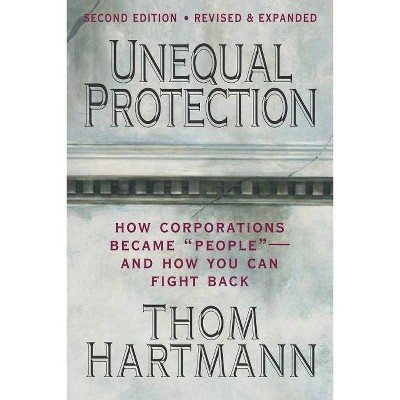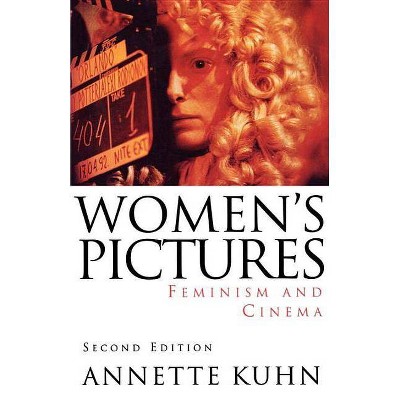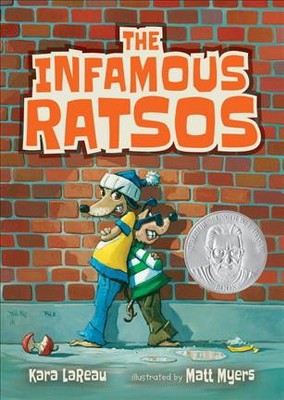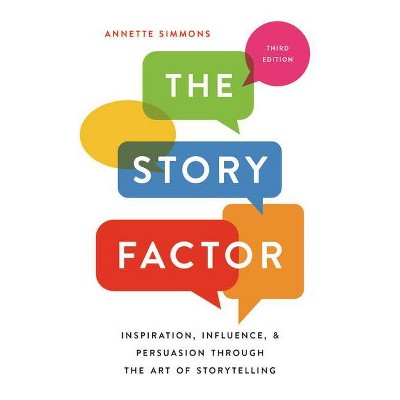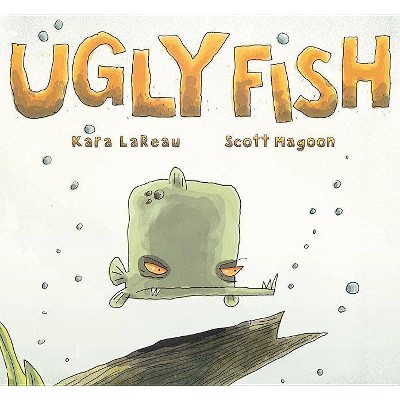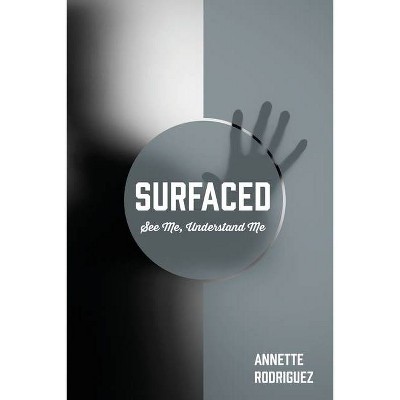Unequal Childhoods - 2nd Edition by Annette Lareau (Paperback)
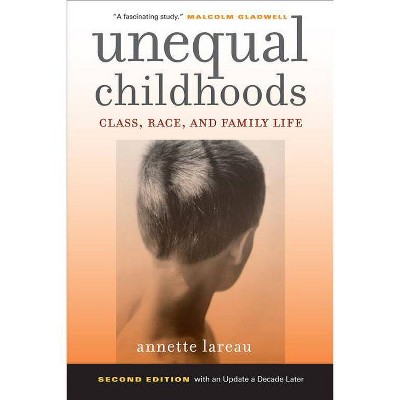
Similar Products
Products of same category from the store
AllProduct info
<p/><br></br><p><b> About the Book </b></p></br></br>"So where does something like practical intelligence come from?...Perhaps the best explanation we have of this process comes from the sociologist Annette Lareau, who...conducted a fascinating study of a group of third graders. You might expect that if you spent such an extended period in twelve different households, what you would gather is twelve different ideas about how to raise children...What Lareau found, however, is something much different." --Malcolm Gladwell, "Outliers: The Story of Success" <BR>"Less than one in five Americans think 'race, gender, religion or social class are very important for getting ahead in life, ' Annette Lareau tells us in her carefully researched and clearly written new book. But as she brilliantly shows, everything from looking authority figures in the eye when you shake their hands to spending long periods in a shared space and squabbling with siblings is related to social class. This is one of the most penetrating works I have read on a topic that only grows in importance as the class gap in America widens."--Arlie Russell Hochschild, author of "The Time Bind" and "The Commercialization of Intimate Life" <BR>"This is a great book, not only because of its powerful portrayal of class inequalities in the United States and its insightful analysis of the processes through which inequality is reproduced, but also because of its frank engagement with methodological and analytic dilemmas usually glossed over in academic texts. Hardly any other studies have the rich, intensive ethnographic focus on family of "Unequal Childhoods."" --Diane Reay, "American Journal of Sociology" <BR>"Lareau does sociology and lay readers alike an important service in her engaging book, "Unequal Childhoods," by showing us exactly what kinds of knowledge, upbringing, skills, and bureaucratic savvy are involved in this idea, and how powerfully inequality in this realm perpetuates economic inequality. Through textured and intimate observation, Lareau takes us into separate worlds of pampered but overextended, middle-class families and materially stressed, but relatively relaxed, working-class and poor families to show how inequality is passed on across generations." --Katherine Newman, "Contexts" <BR>"Sociology at its best. In this major study, Lareau provides the tools to make sense of the frenzied middle-class obsession with their offspring's extracurricular activities; the similarities between black and white professionals; and the paths on which poor and working class kids are put by their circumstances. This book will help generations of students understand that organized soccer and pick-up basketball have everything to do with the inequality of life chances."--Michele Lamont, author of "The Dignity of Working Men: Morality and the Boundaries of Race, Class, and Immigration" <BR>"Drawing upon remarkably detailed case studies of parents and children going about their daily lives, Lareau argues that middle-class and working-class families operate with different logics of childrearing, which both reflect and contribute to the transmission of inequality. An important and provocative book."--Barrie Thorne, author of "Gender Play: Girls and Boys in School" <BR>"With rich storytelling and insightful detail, Lareau takes us inside the family lives of poor, middle-class, and affluent Americans and reminds us that class matters. "Unequal Childhoods" thoughtfully demonstrates that class differences in cultural resources, played out in the daily routines of parenting, can have a powerful impact on children's chances for climbing the class ladder and achieving the American dream. This provocative and often disturbing book will shape debates on the U.S. class system for decades to come."--Sharon Hays, author of "Flat Broke with Children" <BR>"Drawing on intimate knowledge of kids and families studied at school and at home, Lareau examines the social changes<p/><br></br><p><b> Book Synopsis </b></p></br></br>Class does make a difference in the lives and futures of American children. Drawing on in-depth observations of black and white middle-class, working-class, and poor families, Unequal Childhoods explores this fact, offering a picture of childhood today. Here are the frenetic families managing their children's hectic schedules of "leisure" activities; and here are families with plenty of time but little economic security. Lareau shows how middle-class parents, whether black or white, engage in a process of "concerted cultivation" designed to draw out children's talents and skills, while working-class and poor families rely on "the accomplishment of natural growth," in which a child's development unfolds spontaneously-as long as basic comfort, food, and shelter are provided. Each of these approaches to childrearing brings its own benefits and its own drawbacks. In identifying and analyzing differences between the two, Lareau demonstrates the power, and limits, of social class in shaping the lives of America's children. <br /><br />The first edition of <i>Unequal Childhoods</i> was an instant classic, portraying in riveting detail the unexpected ways in which social class influences parenting in white and African American families. A decade later, Annette Lareau has revisited the same families and interviewed the original subjects to examine the impact of social class in the transition to adulthood.<p/><br></br><p><b> From the Back Cover </b></p></br></br>"So where does something like practical intelligence come from?...Perhaps the best explanation we have of this process comes from the sociologist Annette Lareau, who...conducted a fascinating study of a group of third graders. You might expect that if you spent such an extended period in twelve different households, what you would gather is twelve different ideas about how to raise children...What Lareau found, however, is something much different." --Malcolm Gladwell, <i>Outliers: The Story of Success</i> <p/> "Less than one in five Americans think 'race, gender, religion or social class are very important for getting ahead in life, ' Annette Lareau tells us in her carefully researched and clearly written new book. But as she brilliantly shows, everything from looking authority figures in the eye when you shake their hands to spending long periods in a shared space and squabbling with siblings is related to social class. This is one of the most penetrating works I have read on a topic that only grows in importance as the class gap in America widens."--Arlie Russell Hochschild, author of <i>The Time Bind</i> and <i>The Commercialization of Intimate Life</i> <p/> "This is a great book, not only because of its powerful portrayal of class inequalities in the United States and its insightful analysis of the processes through which inequality is reproduced, but also because of its frank engagement with methodological and analytic dilemmas usually glossed over in academic texts. Hardly any other studies have the rich, intensive ethnographic focus on family of <i>Unequal Childhoods</i>." --Diane Reay, <i>American Journal of Sociology</i> <p/> "Lareau does sociology and lay readers alike an important service in her engaging book, <i>Unequal Childhoods</i>, by showing us exactly what kinds of knowledge, upbringing, skills, and bureaucratic savvy are involved in this idea, and how powerfully inequality in this realm perpetuates economic inequality. Through textured and intimate observation, Lareau takes us into separate worlds of pampered but overextended, middle-class families and materially stressed, but relatively relaxed, working-class and poor families to show how inequality is passed on across generations." --Katherine Newman, <i>Contexts</i> <p/> "Sociology at its best. In this major study, Lareau provides the tools to make sense of the frenzied middle-class obsession with their offspring's extracurricular activities; the similarities between black and white professionals; and the paths on which poor and working class kids are put by their circumstances. This book will help generations of students understand that organized soccer and pick-up basketball have everything to do with the inequality of life chances."--Michele Lamont, author of <i>The Dignity of Working Men: Morality and the Boundaries of Race, Class, and Immigration</i> <p/> "Drawing upon remarkably detailed case studies of parents and children going about their daily lives, Lareau argues that middle-class and working-class families operate with different logics of childrearing, which both reflect and contribute to the transmission of inequality. An important and provocative book."--Barrie Thorne, author of <i>Gender Play: Girls and Boys in School</i> <p/> "With rich storytelling and insightful detail, Lareau takes us inside the family lives of poor, middle-class, and affluent Americans and reminds us that class matters. <i>Unequal Childhoods</i> thoughtfully demonstrates that class differences in cultural resources, played out in the daily routines of parenting, can have a powerful impact on children's chances for climbing the class ladder and achieving the American dream. This provocative and often disturbing book will shape debates on the U.S. class system for decades to come."--Sharon Hays, author of <i>Flat Broke with Children</i> <p/> "Drawing on intimate knowledge of kids and families studied at school and at home, Lareau examines the social changes that have turned childhood into an extended production process for many middle-class American families. Her depiction of this new world of childhood--and her comparison of the middle-class ideal of systematic cultivation to the more naturalistic approach to child development to which many working-class parents still adhere--maps a critically important dimension of American family life and raises challenging questions for parents and policy makers."--Paul DiMaggio, Professor of Sociology, Princeton University <p/> "Annette Lareau has written another classic. Her deep insights about the social stratification of family life and childrearing have profound implications for understanding inequality -- and for understanding the daily struggles of everyone attempting to raise children in America. Lareau's findings have great force because they are thoroughly grounded in compelling ethnographic evidence."--Adam Gamoran, Professor of Sociology and Educational Policy Studies at the University of Wisconsin-Madison <p/> "With the poignant details of daily life assembled in a rigorous comparative design, Annette Lareau has produced a highly ambitious ethnographic study that reveals how social class makes a difference in children's lives. <i>Unequal Childhoods</i> will be read alongside Sewell and Hauser, Melvin Kohn, and Bourdieu. It is an important step forward in the study of social stratification and family life, and a valuable exemplar for comparative ethnographic work."--Mitchell Duneier, author of <i>Sidewalk and Slim's Table</i><p/><br></br><p><b> Review Quotes </b></p></br></br><br>". . . a remarkable contribution . . . Through [Lareau's] work, we are persuaded that social class--and its reproductive potential--is embodied in the very complex, yet ordinary, cultural dimensions of our everyday lives. What now remains is for teachers of sociology to embrace this book, so that future generations of students might be inspired by Lareau's provocative cultural sociology."-- "Teaching Sociology"<br><br>". . . an excellent contribution to the growing literature in the sociology of childhood. Carefully researched and well written, it will make a great addition to courses on social inequality, children and youth, or the family."-- "Journal of Marriage and Family"<br><br>"<i>Unequal Childhoods</i> captures the social-science imagination just as Betty Friedan's 1963 best seller, The Feminine Mystique, had captured the public imagination in restating the arguments for feminism."-- "Chronicle Of Higher Education"<br><br>"At both its best and its worst, social-science research tells us what we already know. Annette Lareau's new book is, however, quite different, and packed with insights into such matters as precisely how middle-class children acquire the habits of success and sense of the entitlement early. . . . as exciting to read as it is depressing in its implication."-- "Scotsman"<br><br>"Does social class make a difference in how parents raise children? Annette Lareau answers this question with a resounding "yes" in this absorbing and thought-provoking book."-- "Contemporary Sociology"<br><br>"Lareau began her data collection for <i>Unequal Childhoods</i> in 1989, intensively observing twelve families between 1993 and 1995. The passage of time takes nothing away from this new edition, nor does it mitigate the impact or resonance of its findings. The book's lasting contribution is Lareau's conclusion that the childrearing patterns persist over time."-- "Canadian Journal of Sociology"<br><br>"This accessible ethnographic study offers valuable insights into contemporary family life in poor, working class and middle class American households. . . . A careful and interesting investigation of life in 'the land of opportunity' and the 'land of inequality.'"-- "Publishers Weekly"<br><br>"This is a great book, not only because of its powerful portrayal of class inequalities in the United Stats and its insightful analysis of the processes through which inequality is reproduced, but also because of its frank engagement with methodological and analytic dilemmas usually glossed over in academic texts. It merits a wide readership not only in the United States but also in Europe and would be of interest not only to academics but also to teachers and parents."-- "American Journal of Sociology"<br><br>"This sensitive, well-balanced book is highly recommended for academic, special, and large public libraries."-- "Library Journal"<br><br>"While other studies allude to these class differences, especially in school contexts, this study takes readers even deeper into the lives of children than most. The result is a richer understanding of how cultural repertoires imparted to children vary by class in ways that entrench class inequality at early ages. . . . All in all, this is a thought-provoking book sure to become a classic for scholars working to understand how inequality is reproduced. In addition, its readability and clear expression of basic sociological ideas about social class, inequality, and family life make it ideal for use in undergraduate classes covering any of these topics."-- "Social Forces"<br><br>"Lareau's work is well known among sociologists, but neglected by the popular media; . . . in books like <i>Unequal Childhoods</i> -- Lareau has been able to capture the texture of inequality in America. She's described how radically child-rearing techniques in upper-middle-class homes differ from those in working-class and poor homes, and what this means for the prospects of the kids inside."-- "New York Times" (3/9/2006 12:00:00 AM)<br><p/><br></br><p><b> About the Author </b></p></br></br><b>Annette Lareau</b> is the Stanley I. Sheerr Professor at the University of Pennsylvania. She is faculty member in the Department of Sociology with a secondary appointment in the Graduate School of Education. Lareau is the author of <i>Home Advantage: Social Class and Parental Intervention in Elementary Education</i> (1989; second edition, 2000), and coeditor of <i>Social Class: How Does it Work?</i> (2009); and <i>Education Research on Trial: Policy Reform and the Call for Scientific Rigor</i> (2009); and <i>Journeys through Ethnography: Realistic Accounts of Fieldwork </i>(1996).
Price History
Cheapest price in the interval: 27.99 on October 22, 2021
Most expensive price in the interval: 27.99 on December 20, 2021
Price Archive shows prices from various stores, lets you see history and find the cheapest. There is no actual sale on the website. For all support, inquiry and suggestion messages communication@pricearchive.us
